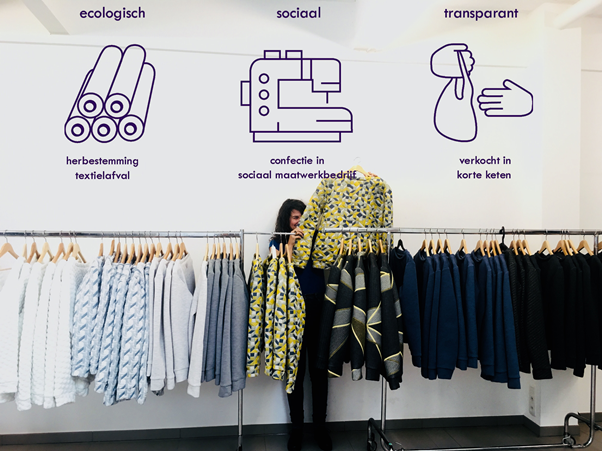GHENT START-UP TAKES ON CUSTOM WORKERS FOR CIRCULAR FASHION
Social economy
Ghent designer Soraya Wancour founded the Studio AMA fashion label with a clear objective in mind: to make the fashion industry more sustainable and social. Her circular fashion collection, made from textile waste, is produced in custom manufacturing businesses.
With her Studio AMA ethical fashion label, Soraya Wancour wants to create a counterbalance against fast fashion: low-cost clothing produced at high speed in poor working conditions. “I make responsible fashion which is as sustainable as possible.”
Residual waste
The textile and fashion industries are often still lacking sustainability. Waste, poor working conditions, many parcels flying back and forth, etc. Ms Wancour sought and found an answer. “I want to offer my customers transparency. Accordingly, I only use residual waste from the local textile industry. My new range of sweaters, for instance, is made entirely from mattress covers.”, says the designer. “I don’t package my items either and they don’t have a label sewn in. What’s more, I try to avoid residual waste myself by using up as much fabric as possible.”
Demand-driven approach
Ms Wancour makes a conscious choice in favour of giving the circular story a social interpretation as well. She has her collection made up invariably by custom manufacturing businesses. Her sweaters are made at vzw Zonnehoeve [not-for-profit association], near Ghent. That custom manufacturing business has its own textile department with fully equipped machines, ready for use producing high-quality sweaters.
“Our collaboration runs very smoothly, even though it is something of a quest for both sides. At vzw Zonnehoeve they listen to my wishes and they look for customised solutions together constructively. This demand-driven approach is necessary too. Studio AMA works in each case with a limited-run clothing range. This small-scale production was rather an atypical assignment, different from processing large volumes in a short timeframe. Nonetheless, I still felt we were on the same wavelength. Since then it has become interactive. I consult with them about the possibilities and they give me feedback. I take this feedback onboard when selecting materials or creating new designs.”
“The same product keeps recurring, but made up in different fabric. For each product that is launched, there is a start-up period, in which optimal quality solutions are sought. Getting this right involves work. My orders are small: this is also because I’m a start-up. I ask for a complete product, not just a small item in the chain, something that is somewhat more common in custom manufacturing.”
Growth process
Making up high-quality clothing was something new for the vzw Zonnehoeve custom workers. They did have relevant experience with stitching and cutting fabrics, producing cherry pit pillows for example. To make the transition to the new product, they were able to rely on optimal support from their coach. “She has a good understanding of the strengths and weaknesses of each employee. She is able to match the supply and demand of skills perfectly. This gives the custom workers an opportunity to learn, stimulating their personal growth. A significant consideration to strengthen our collaboration towards the future as well”, according to Ms Wancour.
Short supply chain
Ms Wancour has closed the short chain by going for a local custom manufacturing business once again – vzw Zonnehoeve is located at a stone’s throw from the Studio AMA atelier. Would you like to discuss a production line? Pick up a sample? The young designer will be there on her bike in no time. Sustainable, socially responsible and local fashion – Studio AMA’s success shows it can be done.
“A short supply chain means that there are no intermediate links, no dealers in residual fractions, no reps or boutiques, all of whom want their slice of the cake, which means the price of the product goes through the roof. A short supply chain does not relate per se to physical distance. It is more a matter of the road a product has travelled and all those whose hands it has passed through. A short supply chain encourages transparency, which also ensures that products get closer to the end consumer.”
Coaching course
As a social entrepreneur, Soraya Wancour was able to rely on support from the Department of Work and Social Economy. She took part in one of the coaching courses. By means of group sessions and individual coaching, she learned how, as an entrepreneur, she would be able to approach the specific challenges in the social sector effectively. Ms Wancour: “I know how to make patterns and interpret the quality of fabrics, but running a business is much more than that. Furthermore, in the group sessions I sat around a table with people who are employed in custom manufacturing businesses. I was also given individual coaching by someone with experience in the social sector. I benefited a great deal from this coaching.”
